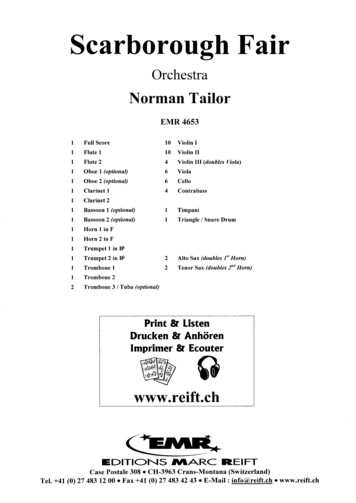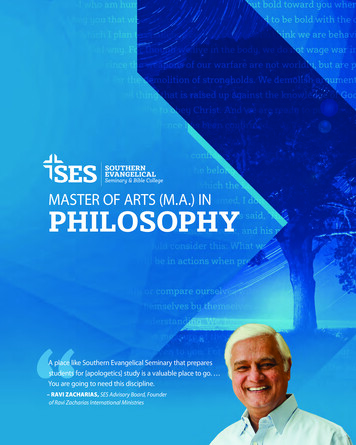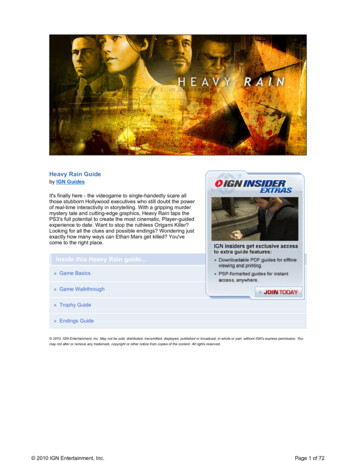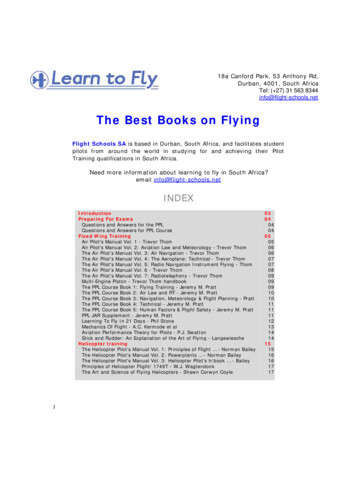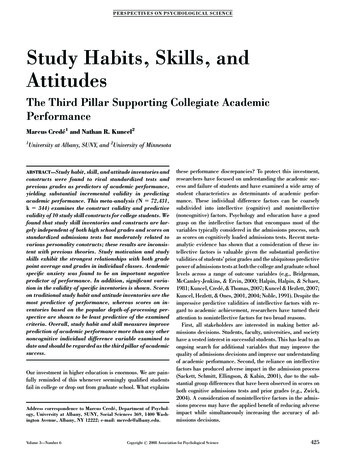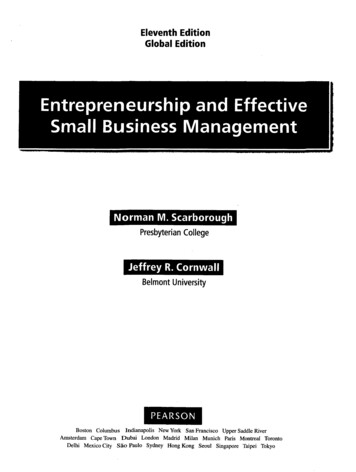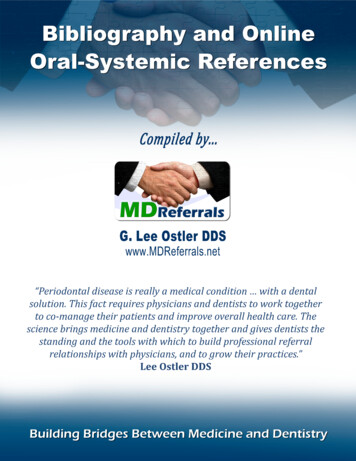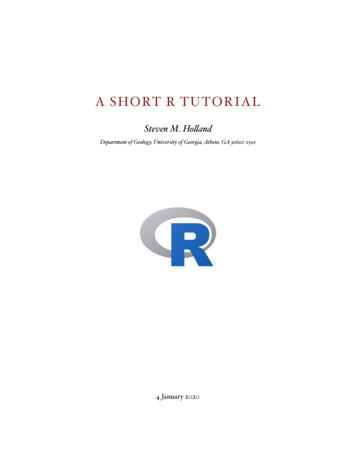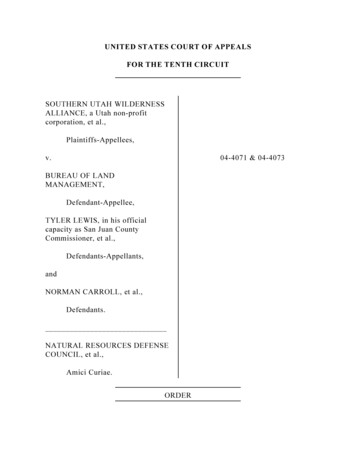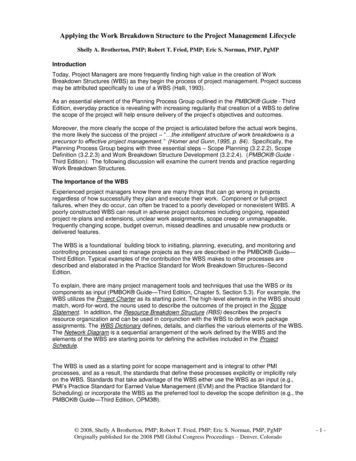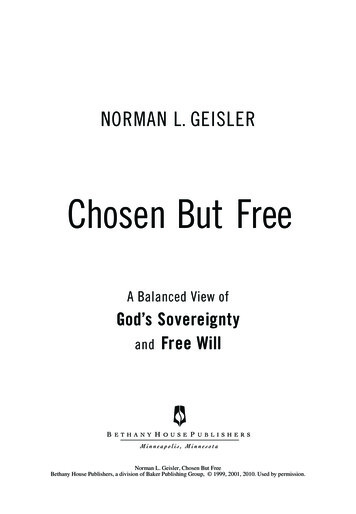
Transcription
NORMAN L. GEISLERChosen But FreeA Balanced View ofGod’s Sovereigntyand Free WillNorman L. Geisler, Chosen But FreeBethany House Publishers, a division of Baker Publishing Group, 1999, 2001, 2010. Used by permission.ChosenButFree.indd 36/23/10 12:09:31 PM
Chosen But Free, 3rd editionCopyright 1999, 2001, 2010Norman L. GeislerCover design by Dan PittsItalics for emphasis in quoted Scripture is the author’s.Unless otherwise identified, Scripture quotations are from the HOLY BIBLE, NEWINTERNATIONAL VERSION. Copyright 1973, 1978, 1984 by International Bible Society.Used by permission of Zondervan Publishing House. All rights reserved. The “NIV” and“New International Version” trademarks are registered in the United States Patent andTrademark Office by International Bible Society. Use of either trademark requiresthe permission of International Bible Society.Scripture quotations identified NKJV are from the New King James Version of the Bible.Copyright 1979, 1980, 1982 by Thomas Nelson, Inc., Publishers.Used by permission. All rights reserved.Scripture quotations identified ESV are from The Holy Bible, English Standard Version, (ESV), copyright 2001 by Crossway, a publishing ministry of Good News Publishers.Used by permission. All rights reserved.Scripture quotations identified KJV are from the King James Version of the Bible.Scripture quotations identified NASB are taken from the NEW AMERICAN STANDARDBIBLE. Copyright 1960, 1962, 1963, 1968, 1971, 1972, 1973, 1975, 1977, 1995by the Lockman Foundation. Used by permission.All rights reserved. No part of this publication may be reproduced, stored in a retrieval system,or transmitted in any form or by any means—electronic, mechanical, photocopying, recording,or otherwise—without the prior written permission of the publisher. The only exceptionis brief quotations in printed reviews.Published by Bethany House Publishers11400 Hampshire Avenue SouthBloomington, Minnesota 55438Bethany House Publishers is a division ofBaker Publishing Group, Grand Rapids, Michigan.Printed in the United States of AmericaLibrary of Congress Cataloging-in-Publication DataGeisler, Norman L.Chosen but free : a balanced view of God’s sovereignty and free will /Norman L. Geisler. —3rd ed.p. cm.Includes bibliographical references and index.Summary: “Respected author, seminary professor, and apologist presents a moderate view ofdivine sovereignty vs. human responsibility. In the third edition he addresses current debatesurrounding free will and destination, including response to critics”—Provided by publisher.ISBN 987-0-7642-0844-7 (pbk. : alk. paper) 1. Predestination. 2. Free will and determinism.3. Providence and government of God—Christianity. 4. God (Christianity)—Omniscience.5. Calvinism. 6. Arminianism. I. Title.BT810.3 .G45 2010233’.7—dc222010014544Norman L. Geisler, Chosen But FreeBethany House Publishers, a division of Baker Publishing Group, 1999, 2001, 2010. Used by permission.ChosenButFree.indd 46/23/10 12:09:31 PM
To all my studentswho for the past fify-one yearshave asked more questions about thisthan any other topic.Norman L. Geisler, Chosen But FreeBethany House Publishers, a division of Baker Publishing Group, 1999, 2001, 2010. Used by permission.ChosenButFree.indd 56/23/10 12:09:31 PM
DR. NORMAN L. GEISLER is author or coauthor of more thanseventy books. He has taught at the university and graduate levels for more than fifty years and has spoken and debated all overthe world. He holds an MA from Wheaton College and a PhD inphilosophy from Loyola University, and is presently Provost andDistinguished Professor of Apologetics at Veritas Evangelical Seminary (VeritasSeminary.com) in Murrieta, California.Norman L. Geisler, Chosen But FreeBethany House Publishers, a division of Baker Publishing Group, 1999, 2001, 2010. Used by permission.ChosenButFree.indd 68/30/11 3:03 PM
ACKNOWLEDGMENTSMy appreciation to my wife, Barbara, for her patient proofing ofthe manuscript. This text was also improved considerably by thekeen insights and many helpful suggestions of Professors Robert Culver, Fred Howe, and Thomas Howe, along with Bob andGretchen Passantino.Norman L. Geisler, Chosen But FreeBethany House Publishers, a division of Baker Publishing Group, 1999, 2001, 2010. Used by permission.ChosenButFree.indd 76/23/10 12:09:31 PM
Norman L. Geisler, Chosen But FreeBethany House Publishers, a division of Baker Publishing Group, 1999, 2001, 2010. Used by permission.ChosenButFree.indd 86/23/10 12:09:31 PM
CONTENTS1.2.3.4.5.6.7.8.9.10.Ideas Do Have Consequences . . . . . . . . . . . . . . . . . . . . . . . . . 11What Are the Alternatives? . . . . . . . . . . . . . . . . . . . . . . . . . . . 15Who’s in Charge? . . . . . . . . . . . . . . . . . . . . . . . . . . . . . . . . . . . 22Why Blame Me? . . . . . . . . . . . . . . . . . . . . . . . . . . . . . . . . . . . . 31Avoiding the Extreme Sovereignty View . . . . . . . . . . . . . . . . 51Avoiding the Extreme Sovereignty View (continued) . . . . . . 73Avoiding the Extreme Free Will View . . . . . . . . . . . . . . . . . 108Seeking a Biblical Balance . . . . . . . . . . . . . . . . . . . . . . . . . . . 130So What? . . . . . . . . . . . . . . . . . . . . . . . . . . . . . . . . . . . . . . . . 160Responding to Critics . . . . . . . . . . . . . . . . . . . . . . . . . . . . . . t Church Fathers on Free Will . . . . . . . . . . . . . . . . . . .Was Calvin a Calvinist? . . . . . . . . . . . . . . . . . . . . . . . . . . . . .The Origins of Extreme Calvinism . . . . . . . . . . . . . . . . . . .Answering Objections to Free Will . . . . . . . . . . . . . . . . . . .Is Faith a Gift Only to the Elect? . . . . . . . . . . . . . . . . . . . . . .Biblical Support for Unlimited Atonement . . . . . . . . . . . . .Double-Predestination . . . . . . . . . . . . . . . . . . . . . . . . . . . . .Jonathan Edwards on Free Will . . . . . . . . . . . . . . . . . . . . . .Is Regeneration Prior to Faith? . . . . . . . . . . . . . . . . . . . . . . .Monergism vs. Synergism . . . . . . . . . . . . . . . . . . . . . . . . . . .Extreme Calvinism and Voluntarism . . . . . . . . . . . . . . . . . .Understanding Calvinism’s Five Points . . . . . . . . . . . . . . . .The Canons of Dort . . . . . . . . . . . . . . . . . . . . . . . . . . . . . . .Four Views on Eternal Security . . . . . . . . . . . . . . . . . . . . . raphy . . . . . . . . . . . . . . . . . . . . . . . . . . . . . . . . . . . . . . . . . . . . . . 327Subject Index . . . . . . . . . . . . . . . . . . . . . . . . . . . . . . . . . . . . . . . . . . . . . 332Scripture Index . . . . . . . . . . . . . . . . . . . . . . . . . . . . . . . . . . . . . . . . . . . . 339Norman L. Geisler, Chosen But FreeBethany House Publishers, a division of Baker Publishing Group, 1999, 2001, 2010. Used by permission.ChosenButFree.indd 96/23/10 12:09:31 PM
Norman L. Geisler, Chosen But FreeBethany House Publishers, a division of Baker Publishing Group, 1999, 2001, 2010. Used by permission.ChosenButFree.indd 106/23/10 12:09:33 PM
CHAPTER ONEIdeas Do Have ConsequencesIn his excellent book Ideas Have Consequences, Richard Weaver demonstrates what philosophers and psychologists have known for centuries:Ideas do have consequences, and the mind does matter. Weaver puts hiscentral points this way:One may be accused here of oversimplifying the historical process, but I takethe view that conscious policies of men and governments are not mere rationalizations of what has been brought about by unaccountable forces. Theyare rather deductions from our most basic ideas of human destiny, and theyhave a great, though not unobstructed, power to determine our course.1Why do ideas matter? Because the thoughts we entertain—especiallythose we seriously entertain—tend to influence our choices. Belief leadsto behavior. Ideas lead to actions. History is replete with examples, bothgood and bad.Richard Weaver, Ideas Have Consequences (Chicago: University of Chicago Press, 1984), 3.1 Norman L. Geisler, Chosen But FreeBethany House Publishers, a division of Baker Publishing Group, 1999, 2001, 2010. Used by permission.ChosenButFree.indd 116/23/10 12:09:35 PM
CHOSEN BUT FREEIt is a psychological fact that every idea entertained by the mindtends to express itself in an action. We see this in little children wholearn by imitation. Even adults have models and heroes after whomthey pattern their lives.If ideas matter, and if big ideas matter a lot, then it matters whetherour ideas are good or bad. In fact, if ideas have consequences, then goodideas will have good consequences. History, psychology, philosophy, andtheology likewise testify to the truth of this premise: Bad ideas will havebad consequences. Jesus said hate leads to murder and lust to adultery(Matt. 5:22, 28). Pornography leads to perversion; hardcore porn evenleads to violent crime.2One tragic example of bad ideas leading to bad consequences isfound in Adolf Hitler, who believed in social evolution. Hitler appliedthe Darwinian “survival of the fittest” to the human race and concludedthe following:If Nature does not wish that weaker individuals should mate with stronger, she wishes even less that a superior race should intermingle with aninferior one; because in such a case all her efforts, throughout hundredsof thousands of years, to establish an evolutionary higher stage of being,may thus be rendered futile.3This idea’s consequence? The holocaust, in which millions of peoplewere killed.If ideas have consequences, then good ideas will have good consequences. The Red Cross, hospitals, schools, representative government,and aid for the poor and oppressed are all examples of good ideas thatled to good actions. Little wonder that the apostle Paul wrote:Brothers, whatever is true, whatever is honorable, whatever is just, whatever is pure, whatever is lovely, whatever is commendable, if there is anyexcellence, if there is anything worthy of praise, think about these things.(Phil. 4:8 esv)S ee N. L. Geisler, Christian Ethics: Options and Issues, rev. ed. (Grand Rapids: Baker, 2009). Seeappendix 3 on “Pornography.”3 Adolf Hitler, Mein Kampf (orig. 1924; reprint, London: Hurst & Blackett, 1939), 239–40.2 Norman L. Geisler,12 Chosen But FreeBethany House Publishers, a division of Baker Publishing Group, 1999, 2001, 2010. Used by permission.ChosenButFree.indd 126/23/10 12:09:35 PM
I d e a s D o H av e C o n s e q u e n c e sWHY IDEAS ABOUT GOD MATTERA. W. Tozer made this observation in the first line of The Idea of theHoly: “What you think of God is the most important thing about you.”Once more, the reason is simple. If ideas have consequences, then bigideas will have big consequences, and the idea of God is the biggest ideawe will ever have. Anselm said, “God is that than which nothing greatercan be conceived.”This means our theology (our ideas of God) will have the greatestconsequences in our lives. Theological or doctrinal ideas are the mostrelevant ones we have. God is the ultimate in our thinking, and ultimatethoughts have ultimate significance.WHAT’S THE BIG IDEA?This book is a comparison and contrast between two great theological “ideas”: divine sovereignty and human free will. We will discoverthat whether one holds to extreme or moderate forms of these ideas willaffect his/her lifestyle. The next chapter will explain the different ideasabout how to relate these truths. The rest of the book will attempt torelate them in a balanced way and avoid the extremes at either end.THE IDEA OF GOD’S SOVEREIGNTYSovereignty means “what a sovereign has,” namely, control over hiskingdom. God’s sovereignty—the idea that God is in control of the wholeuniverse—is a doctrine clearly taught in the Bible (see chapter 3).Yours, O Lord, is the greatness and the power and the glory and the majestyand the splendor, for everything in heaven and earth is yours. Yours, O Lord, isthe kingdom; you are exalted as head over all. Wealth and honor come fromyou; you are the ruler of all things. (1 Chron. 29:11–12)God’s sovereignty is a good idea. Properly understood, knowingthat an all-good and all-powerful God is in charge of all that happenscan lead to a sense of security and tranquillity.Nonetheless, taken to an extreme, the idea of sovereignty can leadeven to self-destruction. Some time ago, I received a letter of appreciationNorman L. Geisler,13Chosen But FreeBethany House Publishers, a division of Baker Publishing Group, 1999, 2001, 2010. Used by permission.ChosenButFree.indd 136/23/10 12:09:35 PM
CHOSEN BUT FREEfrom a woman who read the first edition of this book. She told of beingin a church that took the doctrine of sovereignty to the extreme. Theyreasoned that if God has determined everything, then all is determined,and if everything is fixed in advance, then there’s nothing we can do aboutit. After preaching this philosophy for some time, the pastor became sodepressed he committed suicide.THE IDEA OF HUMAN FREE WILLHuman responsibility and the ability to make free choices were partof God’s plan for us from the beginning. Adam was told not to make thebad choice of eating the forbidden fruit (Gen. 2:17); he chose to disobeyGod (Rom. 5:19). Even now, in our fallen state, we have the free choiceto accept or reject God’s gracious provision of salvation.However, like any other good thing, the doctrine of free will can betaken too far. One Process Theologian4 who stressed human free willto the extreme actually said that even God does not know what we aregoing to do with our freedom, and that God “is waiting with bated breathto see how things are going to turn out”! If God does not know what’sgoing to happen in the future, then we cannot know there will be a goodend to the human story. Surely this can lead to desperation.WHAT IDEAS ARE COMING NEXTWe will engage both divine sovereignty and human free will and try tofind a balance between them. First, we will discuss the major ways to relatesovereignty and free will (chapter 2). Then we will become more specific byseeing what the Bible says about God’s sovereignty (chapter 3). Followingthis, we will take a look at what is meant by free will (chapter 4). Afterwardwe will look at two extremes: one that misunderstands sovereignty (chapters5–6) and another that misunderstands free will (chapter 7). Then we willseek a middle view (chapter 8) and show its practical benefits (chapter 9).Finally, we will address criticism of our conclusions (chapter 10).This book’s appendices are also very important, as they give additional details on the book’s main points and form a more scholarly version of the chapters’ simplified material.4 See chapter 7.Norman L. Geisler,14 Chosen But FreeBethany House Publishers, a division of Baker Publishing Group, 1999, 2001, 2010. Used by permission.ChosenButFree.indd 146/23/10 12:09:37 PM
CHAPTER TWOWhat Are the Alternatives?There are three basic views on how to relate divine sovereignty andhuman free choice. The first we will call the “extreme Sovereignty”view. The second will be labeled the “extreme free will” view. The thirdis named the “balanced view,” by which we mean a balance betweensovereignty and free will.THE EXTREME SOVEREIGNTY VIEWGod’s ControlThis position understands sovereignty in the strong sense of divinecontrol over and determination of the entire universe and of all actionsin it. God is in complete charge of all that happens and will happen,including all free choices of His creatures. Nothing we do can changeHis fixed plan, which He preordained from all eternity. The future is notopen to being “helped” in its formation by our free actions.Norman L. Geisler, Chosen But FreeBethany House Publishers, a division of Baker Publishing Group, 1999, 2001, 2010. Used by permission.ChosenButFree.indd 156/23/10 12:09:38 PM
CHOSEN BUT FREEGod’s ForeknowledgeGod knows with certainty everything that will happen in the future,including all free actions. Nothing can change this; it is fixed and immutable. Since God is omniscient, He cannot be wrong about anything.Hence, if He knows what’s going to happen—and He knows everythingthat’s going to happen—then it must happen exactly as He foreknew itwould happen.God’s PredestinationGod can make infallible predictions—ones that must come to pass.Indeed, He has predetermined from all eternity every event in the universe, including the salvation of the elect and the damnation of the nonelect. Predestination is not based on His foreknowledge; His election ofsome to salvation is a free choice of His mercy, based only on His will.This is an unconditional election of some to salvation and of leavingothers for damnation (see appendix 7).Man’s Fallen StateFallen human beings, dead in sin, do not even have the ability toreceive the gift of salvation unless God first works in them by His Spiritand gives them, and them alone, the faith to believe in Him (see appendix9). Thus, regeneration comes before faith, and only the regenerate canbelieve. The rest are dead and incapable of belief.God’s GraceHuman will plays no part in our salvation; we are saved by God’swill and God’s will alone. Salvation cannot be sought, attained, or evenreceived as a gift—it is wholly and completely of God (see appendix 10),whose saving love is a voluntary act of mercy. Because of man’s sinfulstate, God did not have to save anyone, but out of sheer grace He decidedfrom all eternity to save some. These, and these alone, are the ones forwhom Christ died (see appendix 6). Only these are operated on by God’sirresistible grace and brought to ultimate salvation.Norman L. Geisler,16 Chosen But FreeBethany House Publishers, a division of Baker Publishing Group, 1999, 2001, 2010. Used by permission.ChosenButFree.indd 166/23/10 12:09:38 PM
W h at A r etheA lt e r n at i v e s ?Man’s Free ChoiceWhat we call “free choice” actually is determined by God; we cannot act contrary to His sovereign will. Even those who “freely” rejectGod do so in accordance with His sovereign will. Hence, the elect arepredestined by God to heaven and the non-elect to hell (or, at least, werenot chosen by God for heaven). True freedom is not freedom to do goodor evil but only to do good. God is free and cannot do evil. Therefore,the ultimate freedom (attained only in heaven) is freedom from evil, notany freedom to do evil. Freedom means “doing what we desire,” and onlyGod can give the desire to do good; any desire to do evil comes from ourown evil nature. Fallen humans have no free will in the sense of havinga self-determined choice to accept God’s gift of salvation.In short, this view places sovereignty over free will. Any act of freewill with regard to salvation comes only as a result of God producing it byHis grace. Even the will to reject God is not self-determined but, rather,is an act ordained by God for the condemnation of the wicked, just asan act for Christ is one given by God for the salvation of the elect.THE EXTREME FREE WILL VIEWGod’s ControlThis position maintains that God does not have rigid control ofthe universe; He gave away some of His sovereignty to His creatureswhen He gave them free choice. God does not determine human freeacts; He reacts to them as He becomes aware of them. The future isnot fixed—it’s open to our free choices to help determine it. What wedecide can change the future.God’s ForeknowledgeGod knows with certainty only what flows from a necessary order ofcauses. Since our free actions are not necessary but based on choices, Godcannot know them for sure. So the future is not immutable. Omniscienceis limited to what is possible for God to know, and it is not possible forGod to know future free choices that free creatures will make. Since Hisknowledge about the future is not infallible, He can make predictions thatNorman L. Geisler,17Chosen But FreeBethany House Publishers, a division of Baker Publishing Group, 1999, 2001, 2010. Used by permission.ChosenButFree.indd 176/23/10 12:09:38 PM
CHOSEN BUT FREEdo not come to pass; what He foretells can have only relative degrees ofprobability. Nonetheless, because of His great knowledge, God is highlyaccurate in His forecasting.God’s PredestinationGod has not predetermined individuals to heaven or hell. Electionis corporate, not individual; each individual must choose his own salvation. God has predestined the bus (Christ) for heaven—people can get on(salvation) or off (reprobation) by their own free choice. Predestinationis based on God’s foreknowledge of who will choose Him and who willnot. Hence, His election is conditional—it is conditioned on our accepting or rejecting Him.Man’s Fallen StateFallen human beings are spiritually dead in that they have no spiritual life. However, God’s image is still present in them. As such, they areable to hear His voice and respond to His offer of salvation, and theymust believe before they are regenerated. All people are capable of thisbelief that brings salvation.God’s GraceGod’s saving love is for all people. Christ died for all humankind, andGod is trying to save everyone. His grace, however, is not irresistible:Some accept and are saved, while some reject it and are lost (though someproponents of this view deny any eternal conscious punishment). Wecannot work for our salvation, but we must work from it. Those whodo not perform the proper good works can lose their salvation, for ifsalvation can be gained by a free choice, it likewise can be lost.Man’s Free ChoiceFree will means the ability to do otherwise. Humans are truly free,having the power of contrary choice. God’s choice of some to salvationis based on His foreknowledge that they would believe in Him. Truefreedom here on earth is the freedom to do good or evil. Only in heavenwill there be freedom from evil; here we are free to reject God and HisNorman L. Geisler,18 Chosen But FreeBethany House Publishers, a division of Baker Publishing Group, 1999, 2001, 2010. Used by permission.ChosenButFree.indd 186/23/10 12:09:38 PM
W h at A r etheA lt e r n at i v e s ?gift of heaven. Indeed, the free choice to accept salvation can later beused to reject and lose it.In short, this view places free will over sovereignty. God does notcompletely control the universe. His work on free creatures is persuasivebut not coercive. In the final analysis, our destiny is determined by ourown free choices. God’s sovereignty is limited by the free creatures Hehas made.THE BALANCED VIEWA third view attempts to balance sovereignty and free will, accepting both as basic biblical truths and seeking to reconcile them withoutmaking one or the other dominant to the exclusion of the other.The extreme Sovereignty view is held by extreme Calvinists.The extreme free will view is embraced by extreme Arminians (alsocalled Open Theists).The balanced (or middle) view is maintained by moderate Calvinists and moderate Arminians. This is not to say there are no differencesbetween moderate Calvinists and moderate Arminians. For example,moderate Calvinists believe in eternal security (once saved, always saved),and moderate Arminians do not. However, they hold many things incommon, including their views on the following.God’s ControlAccording to the balanced (middle) view of sovereignty and free will,God is in “control” of the universe of free creatures by His foreknowledge. He does not force anyone’s freedom, but He knows in advancefrom all eternity exactly what everyone is going to freely do and howmuch persuasion will be needed for them to do it.Further, God was free to create or not create, to create free creaturesor not create them. Knowing exactly what would happen in every possible world, He freely chose to create this one to achieve the greatestgood. His omniscient foreknowledge assures that it’s going to come outexactly as He knew it would.Norman L. Geisler,19Chosen But FreeBethany House Publishers, a division of Baker Publishing Group, 1999, 2001, 2010. Used by permission.ChosenButFree.indd 196/23/10 12:09:38 PM
CHOSEN BUT FREEGod’s ForeknowledgeGod knows with certainty what flows from a necessary order ofcauses. But He also knows for certain what free choices we will make.So, in advance, He infallibly knows the entire future of the universe;it must come to pass as He knew it would, otherwise, He would havebeen wrong, and an omniscient mind cannot be wrong. Since God’sknowledge about the future is infallible, His predictions must cometo pass—they are not “probable forecasts.” The future (including freechoices) is determined from the standpoint of God’s foreknowledge butfree from the vantage of our free will.God’s PredestinationGod has predetermined some individuals to heaven. Election is notmerely corporate; it is individual. Election of an individual is based on(or else according to)1 God’s foreknowledge of their free choices. Henever predestines anyone contrary to their free will but elects only thoseHe foreknew would accept His saving grace. There are no conditionsfor God giving the gift of salvation, but there is one condition for gettingit—one must receive it by faith.Man’s Fallen StateFallen human beings are spiritually dead in that they have no spiritual life. However, God’s image is still present in them; hence, they’reable to hear His voice and respond to His offer of salvation. They mustbelieve as a condition for being regenerated, and everyone is capable ofexercising this belief that brings salvation. But no one ever believes whohas not been persuaded by God’s grace to do so.God’s GraceGod’s saving love is for all people. Christ died for all humankind, andGod is trying to save everyone. His grace, however, is not irresistible; itis persuasive but not coercive. Those who accept Christ are saved, and1 There are two different views. See chapter 8 for an explanation.Norman L. Geisler,20 Chosen But FreeBethany House Publishers, a division of Baker Publishing Group, 1999, 2001, 2010. Used by permission.ChosenButFree.indd 206/23/10 12:09:38 PM
W h at A r etheA lt e r n at i v e s ?those who reject Him are lost. We cannot work for our salvation, butwe must work from it.Man’s Free ChoiceFree choice in this life means “the ability to do otherwise.” Humansare truly free. True freedom here on earth is the freedom to accept orreject God’s offer of salvation. In heaven we will be free from evil; herewe are free to do evil.Norman L. Geisler,21Chosen But FreeBethany House Publishers, a division of Baker Publishing Group, 1999, 2001, 2010. Used by permission.ChosenButFree.indd 216/23/10 12:09:38 PM
CHAPTER THREEWho’s in Charge?The sovereignty of God is a biblical doctrine. How it relates to free willis another question (see chapter 8), but the Bible clearly teaches that Godis in charge of His universe. To deny this, one has to ignore a mass ofScripture. God’s sovereignty, deeply rooted in His attributes, is revealedby (1) His characteristics and (2) His control.THE CHARACTERISTICS OF GODOnce we understand who God is, we can understand why He is incharge of everything. His essential attributes include the following.God Is Before All ThingsGod is “before all things” (Col. 1:17). As the first verse of the Bibleputs it, “In the beginning God . . .” Before there was anything else, therewas God, the Uncreated One. “From everlasting to everlasting, thou artGod” (Ps. 90:2 kjv). There never was a time when God was not. In fact,He existed forever before all things. He is “the First,” “the Beginning,”Norman L. Geisler, Chosen But FreeBethany House Publishers, a division of Baker Publishing Group, 1999, 2001, 2010. Used by permission.ChosenButFree.indd 226/23/10 12:09:40 PM
Who’sinCharge?and “the Alpha” (Rev. 1:8; 1:17; 21:6). Often the Bible speaks of God asbeing there “before the world began” ( John 17:5; cf. Matt. 13:35; 25:34;John 17:24; Rev. 13:8; 17:8).God was not only before all things, but He was before all time. Thatis, He is eternal. God was there “before the beginning of time” (2 Tim. 1:9).In fact, He brought time into existence when He “framed the worlds”(literally, “the ages,” Heb. 1:2, Rotherham trans.). God “alone has immortality” (1 Tim. 6:16 nkjv). We get it only as a gift (Rom. 2:7; 1 Cor. 15:53;2 Tim. 1:10). And our immortality has a beginning; God’s does not.God Created All ThingsNot only is God before all things, but He created all things. “In thebeginning God created the heaven and the earth” (Gen. 1:1 kjv). “Throughhim [Christ] all things were made; without him nothing was made that hasbeen made” ( John 1:3). “By him all things were created: things in heavenand on earth, visible and invisible, whether thrones or powers or rulersor authorities; all things were created by him and for him” (Col. 1:16).God Upholds All ThingsGod not only created all things, He also upholds all things. Hebrewsdeclares that God is “sustaining all things by his powerful word” (1:3).Paul adds, “He is before all things, and in him all things hold together”(Col. 1:17). God not only brought all things into existence but He keepsthem in existence. Both are true, for “they were created and have theirbeing” from God (Rev. 4:11). There is “one Lord, Jesus Christ, throughwhom all things came and through whom we live” (1 Cor. 8:6; cf. Rom.11:36). Hebrews asserts “it was fitting that God, for whom and throughwhom everything exists, should make the author of their salvation perfectthrough suffering” (2:10).God Is Above All ThingsThe God who is before all things He created and who is upholdingall things is also beyond them: He is transcendent. There is “one Godand Father of all, who is over all and through all and in all” (Eph. 4:6).“O Lord, our Lord, how majestic is your name in all the earth! You haveNorman L. Geisler,23Chosen But FreeBethany House Publishers, a division of Baker Publishing Group, 1999, 2001, 2010. Used by permission.ChosenButFree.indd 2
and Free Will Chosen But Free ChosenButFree.indd 3 6/23/10 12:09:31 PM Norman L. Geisler Chosen But Free Bethany House Publishers a division of Baker Publishing Group 1999 1 1. Used by permission. . 3 Adolf Hitler, Mein K
